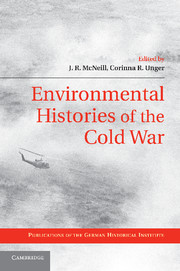Book contents
- Frontmatter
- Contents
- List of Figures
- Contributors
- Introduction: The Big Picture
- PART I SCIENCE AND PLANNING
- PART II GEOPOLITICS AND THE ENVIRONMENT
- 6 Environmental Impacts of Nuclear Testing in Remote Oceania, 1946–1996
- 7 A Curtain of Silence: Asia's Fauna in the Cold War
- 8 Against Protocol: Ecocide, Détente, and the Question of Chemical Warfare in Vietnam, 1969–1975
- 9 Environmental Crisis and Soft Politics: Détente and the Global Environment, 1968–1975
- PART III ENVIRONMENTALISMS
- PART IV EPILOGUE
- Index
9 - Environmental Crisis and Soft Politics: Détente and the Global Environment, 1968–1975
from PART II - GEOPOLITICS AND THE ENVIRONMENT
- Frontmatter
- Contents
- List of Figures
- Contributors
- Introduction: The Big Picture
- PART I SCIENCE AND PLANNING
- PART II GEOPOLITICS AND THE ENVIRONMENT
- 6 Environmental Impacts of Nuclear Testing in Remote Oceania, 1946–1996
- 7 A Curtain of Silence: Asia's Fauna in the Cold War
- 8 Against Protocol: Ecocide, Détente, and the Question of Chemical Warfare in Vietnam, 1969–1975
- 9 Environmental Crisis and Soft Politics: Détente and the Global Environment, 1968–1975
- PART III ENVIRONMENTALISMS
- PART IV EPILOGUE
- Index
Summary
In the late 1960s, as international discourse on global and transborder environmental problems was rapidly developing, the Cold War still divided many of the world's industrialized nations. Slogans and metaphors like “Only One Earth” and “Spaceship Earth” spread around the world. The dynamism of global environmental discourse in the early 1970s has been explained in a variety of ways. Some observers stress the eye-opening effect of books like Rachel Carson's Silent Spring and the Club of Rome's The Limits to Growth. Others point to the spread of new values. The connection at that time between concern for the future of the global environment and the rhetoric of East-West political cooperation has not yet received scholarly attention. When governments in the densely populated countries along the Iron Curtain became more willing to address international problems, they focused on combating marine pollution in the Baltic Sea and the North Sea and on air and river pollution in border regions.
The two German states were deeply involved in these issues. By using West German archival records, this essay tries to assess the influence of détente as a factor in the emergence of environmental issues as factors in Bonn's foreign policy. It seeks to show how attempts were made to develop the environmental question into an integral component of the policy of détente.
- Type
- Chapter
- Information
- Environmental Histories of the Cold War , pp. 257 - 276Publisher: Cambridge University PressPrint publication year: 2010
- 6
- Cited by



